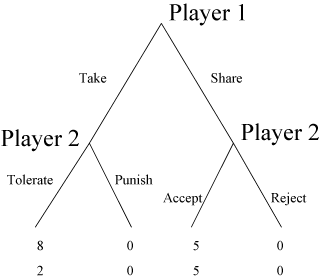|
|
|
The punishment-MUG game is a simplification of the ultimatum game. The dense strategy set of the ultimatum game when the first mover offers any split of a certain fixed amount, say $10, and the second mover can either accept or reject it, is truncated in the following way: Player 1 can only propose an equal split ($5, $5) or an unequal one where he keeps $8 and leaves $2 for the second player. In the second stage of the game player 2 responds to the proposed split by either agreeing to it or by vetoing it. A veto results in $0 payoff to each player.
|
|
The strategies can be given the following names: in the first stage player 1 chooses either Take or Share. If player 1 chose Take, then player 2 in the second stage chooses between Tolerate and Punish. If player 1 chose Share, then player 2 chooses between Accept and Reject.
|
- There are 2 players participating in the two-stage game: player 1 and player 2.
- $10 is to be divided between them.
- Stage 1: player 1 decides whether to choose Share and propose an equal split of ($5, $5) or Take i.e. propose an unequal split of ($8, $2).
- Stage 2: before making his/her move player 2 knows the decision of player 1.
- If player 1 decided to Share, player 2 can either Accept which results in payoffs ($5, $5) or Reject, which results in payoffs($0, $0).
- If player 1 decided to Take, player 2 can choose either Tolerate, which results in payoffs ($8, $2) or Punish, which results in payoffs ($0, $0).
|

|
|
The subgame perfect Nash equilibrium of the punishment-MUG game for the self-regarding preferences model can be derived for by using backward induction. Player 2 prefers Tolerate to Punish and Accept to Reject. Knowing this, player 1 prefers strategy Take over Share. Thus, the NE is given by (Take, Tolerate) which leads to ($8, $2) equilibrium payoffs.
|
|
The punishment-MUG game incorporates motives of negative reciprocity and fear of negative reciprocity. To test for quantitative effects of these motives one can use a triadic design incorporating dictator controls for the fear of punishment and for negative reciprocity. For the descriptions of Punishment-MUG Dictator Controls go to the Dictator Game section.
|
|
The truncation of the strategy set of the ultimatum game allows for an easy use of a strategy response mode in which the subjects are asked to provide a complete contingency plan for each node at which they might have to make a decision as an alternative to sequential extensive form game responses. The punishment-MUG game can also easily be framed as a market exchange game between a seller and a buyer.
|
|
In Cox and Deck (2002) 64% of players 1 chose Take. When comparing with the data from Punishment-MUG Dictator Control 1, one can conclude that first movers? behavior in the Punishment-MUG game is not characterized by fear of negative reciprocity. Furthermore, the expectations of players 1 are rational because only 21% of players 2 chose punish after being offered an unequal split. On the other hand, only 4.5% of players 2 vetoed an equal split.
|
- Cox, James C. and Cary Deck, "On the Nature of Reciprocal Motives," Economic Inquiry, forthcoming.
- Falk, Armin, Ernst Fehr, and Urs Fischbacher, "On the Nature of Fair Behavior," Economic Inquiry, forthcoming.
|
| |